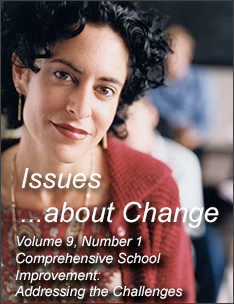In Summary
Although much of the work being done in schools today is called "comprehensive," in fact many efforts continue to focus on a "quick fix" to improve student achievement results rather than addressing the system as a whole and building up the parts in need. Such reforms may suffice in the short term, but they can rarely be sustained over time, or through administrative turnover, staff changes, or legal mandates.
SEDL's FIRST project attempted to address the needs of low-performing schools at a system level and to  increase the capacity of staff to address continuous improvement for the purposes of increasing student learning. In order to do that, however, it was necessary to evaluate how these schools were functioning regarding their student results, the staffs' professional development, and their capacity for growth.
increase the capacity of staff to address continuous improvement for the purposes of increasing student learning. In order to do that, however, it was necessary to evaluate how these schools were functioning regarding their student results, the staffs' professional development, and their capacity for growth.
This project has found that schools that fail to meet the achievement needs of their students often also lack the necessary structures and skills for initiating and sustaining continual growth and improvement—supportive organizational structures, focus for the work, attention to human dynamics, ability to work within multiple contexts, and highly skilled leadership. In order to support meaningful growth and change over time, significant attention must be devoted to strengthening the schools' capacity in each of these areas. Successful comprehensive reform work will necessarily include such a focus.
Although results of the identification and discussion of core issues in these schools seem discouraging, we have found them to be an accurate representation of the challenges currently confronting schools that undertake comprehensive school reform efforts.
SEDL is addressing the challenges that accompany efforts at school reform. The difference between the FIRST project and previous reform efforts lies in this acknowledgment and identification of the issues that affect the schools' past and current efforts to make changes. Without addressing the underlying issues, reform efforts will merely scratch the surface and are unlikely to be sustainable over time to benefit student learning. Identification of the core issues provides insights about schools' current conditions while engaged in comprehensive reform efforts and proves invaluable in determining capacity strengths and needs at each of the school sites.
Comprehensive school reform as it is defined here—engaging an entire school staff in an in-depth, broad-scope examination of the teaching and learning process and working with them to improve student outcomes—plants seeds of change that will continue to grow beyond the limits of this project.
We hope that other external school improvement facilitators will be informed by the findings of this work and will use this information to promote school staffs' growth and learning more effectively, and thus have stronger impact on building schools' capacity for continuous improvement.
We have much yet to learn. True comprehensive reform requires a thoughtful, reflectively adapting pace. As observers and participants in this process, we are learning that continuous reform can be encouraged by practicing tolerance for the investment of time that is necessary, and by nurturing continuous development within the core issues that surface in the process.
The next Issues... about Change paper will report the actions taken by SEDL and school staff at these sites to address the five core issues that emerged in this work.
Next Page: References and Credits

